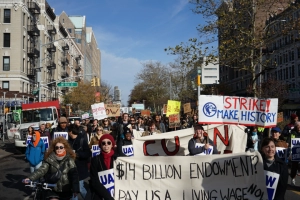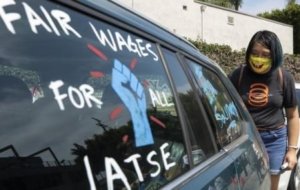
Striking students march in Harlem on Dec. 1, 2021. Credit: Erica Andrade
Striking graduate school student workers at Columbia University ended their labor action Jan. 7 with an agreement that includes a 7 to 11 percent raise for workers with annual contracts based upon the length of their appointments and an hourly wage boost from the previous $15/hour to $21/hour. The annual salaries of doctoral candidates on a 12-month appointment will rise to from $41,080 to $44.500 retroactive to last August. Those on nine-month appointments will go from the present $35,140 to $39,000 and an increase to $42,425 in the contract’s fourth year.
The 3,000 strikers are are represented by the Student Workers of Columbia, United Auto Workers Local 2110. The 10-week strike had developed into tense hostility at times when the university issued a directive firing the strikers if they did not report back to work and the union urging faculty members to join them to shut down the university. Some classes were cancelled when a number of faculty members did join the union picket line.
In addition to the wage increases, the new four-year contract provides for Columbia to cover 75 percent of student workers’ dental insurance, higher stipends for child care and an emergency fund of $300,000 that the workers can access for out-of-pocket medical expenses. It also provides for third-party arbitration in cases alleging discrimination or harassmanet.
“Solidarity Forever”
The Columbia strike, with spirited pickets occasionally singing the old labor song “Solidarity Forever,” came as workers around the country are organizing in record numbers. On Dec. 15, the University of California, Berkeley, agreed to recognize Student Researchers United, a union that plans to affiliate with the United Auto Workers, as the bargaining agent for 17,000 grad student researchers across the UC state university system.
The UC recognition came after nearly 11,000 researchers across the state authorized a strike with 97.5 % voting in favor, according to the UAW. The 17,000 SRU members may constitute the largest bloc of new workers with collective bargaining rights in recent years.
In a series of other actions, grad school workers are demanding collective bargaining rights in record numbers. At Indiana University, the Grad Workers Coalition, part of the United Electrical, Radio and Machine Workers Union (UE) presented 1,500 union cards, 60% of the 2,500 graduate workers, to formally request a union election. Three days later, the Massachusetts Institute of Technology Graduate Student Union, also affiliated with UE, announced that an overwhelming majority of MIT graduate employees have signed union authorization cards. They have asked the university for voluntary recognition of their union. And at the University of New Mexico, the state Employee Labor Relations Board announced that 887 graduate student workers, or more than 57% of the total employed, had signed cards designating the United Graduate Workers (UE) as their bargaining agent.
The Columbia strike, which began Dec. 6,, was the second one this year by the student workers at the school. It was, at the time of the settlement, the largest one in the country. The graduate school workers teach classes, serve as teaching and research assistants, and perform duties, at much reduced pay and benefits, that many of the professors would ordinarily do.
Taking on the perception that the strikers are just students and not workers, Paul Brown, a Local 2110 organizer at Columbia, called on he university to “respect the labor that we put into this institution.”
The strike came as many universities in recent years have increasingly relied on grad student workers rather than tenured professors to teach classes, thus reducing the cost to the university. “We are the ones who do the research that wins grant money for the university,” said Johannah King-Slutzky, one of the strikers in an interview with Democracy Now’s Amy Goodman and Juan Gonzalez. “I teach my own class. Many of my colleagues teach the same classes that a professor would teach. We’re the ones who have the most face-time with the undergraduates who are paying Columbia’s bills, paying tuition.”
Early on, the school responded with heavy-handed attempts to break the strike.One was an email from its Vice President of Human Resources to the strikers that if they do not return to work by Dec. 10 they will be terminated and replaced. Branding it “an illegal form of retaliation,” King-Slutzky pointed out that it is “an unfair labor practice (that) protects us from our labor being permanently replaced.”
For a reprint of the interview with Columbia strikers, see Democracy Now.orgFor further details on the Columbia strike settlement, see NY Times, 1/7; The Real News Network, 1/14; Portside, 1/17.
For news of the other grad school actions, see Portside, 12/16 12/20; The Herald-Times (Indiana), 12/18. and the Boston Globe.




